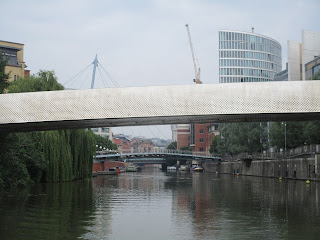Monday 24th June
2019
We disconnected the shoreline cable, having been on shore power,
watered up and made ready while Brenda went shopping to the Tesco’s 100 yards
away, where she bought far too much to carry back on her own. We then crossed
over the harbour to empty the loo and then, reluctantly, left Bristol. It is a
lovely city, lots to do and see, busy and vibrant, and we will return. However,
we had overstayed and wanted to be clear of the harbour before the Harbour
Master made his rounds.
It was a lovely run leaving. First passing through the main harbour,
under the low Prince Street Bridge and passing beside St. Mary Radcliffe Church,
described by Queen Elizabeth I as “the fairest, goodliest and most famous
Parish Church in all England”. Then came a stretch of old warehouses and mills,
now all converted into offices and apartments. Beyond Bristol Bridge we entered
the business district, nearly all modern buildings with a few old warehouses
awaiting development.
Leaving Bristol behind
Passing the iconic Temple Meads Railway station, a sharp 90˚
bend brought us into the feeder channel with industry all along it. This
artificial cut supplies water from the river to the Floating Harbour itself. There
was once a lock sited here, that used to connect with the river. At the end of
the channel was the first lock at Netham. Just to the right, beyond the lock,
was the river weir, built at the height it is to maintain the level in the
harbour. The lock is usually left open unless there is a spring tide which can
top the weir. In this case, the level in the harbour would rise, therefore the lock
is closed to preserve the level.
Passing through Netham Lock
We were now back on the river and gradually left Bristol behind. The
next 5 miles of river provided us with possibly the most scenic stretch of
water we have yet been on. There were no roads to intrude and only the occasional
glimpse of the railway arches through the trees. Hills and trees surrounded the
river. We saw kingfishers aplenty, herons and jays.
Idyllic River Avon outside Bristol
Hanham Lock marks the end of Bristol Harbour jurisdiction and the
start of the Kennet and Avon Canal. It is particularly attractive. This is the upriver
limit of the spring tides. There was a marker beside the lock showing the flood
level in 2013, it was frighteningly high. This was also the first lock we have had
to operate since Stourport some three weeks ago.
Hanham Lock, the first for almost a month,
and the start of the Kennet and Avon Canal
The river locks, as with the whole length of the Kennet and Avon Canal,
are wide beam. The paddles are all gate paddles, the flows vicious and nasty, the
locks slow to fill and the gates very heavy.
Beyond the next lock at Keynsham, is a boatyard full of wrecks of
boats in various stages of decay and old caravans, falling apart. This was such
a shame, there is an old iconic factory here that used to be owned by the Fry’s
Chocolate Company before being bought over by Cadbury’s. It is a lovely building
with decorative brickwork, but totally spoilt. The following ½
mile of river was full of permanently moored boats, all very neglected, full of
green algae, rust, peeling paintwork and bird shit. It came as a shock to
realise that people were actually living on these boats. It was all the more shocking
after the idyllic stretch that preceded it.
Over the next few miles until Swineford Lock, there were numerous other
boats scattered about, all derelict looking, and yet with people living in them.
God knows what conditions are like inside. There is a pontoon at Bitton Railway
Bridge, a 24-hour public mooring. And yet there were about ten boats, double and
tripled breasted together, all derelict looking that have probably been there
for years. They even had pots sitting on the pontoon with potatoes and tomatoes
growing in them, and artificial grass matting on the pontoon itself.
How and why can CRT condone this?
Swineford Lock is in a beautiful setting. The weir is long and the
flow over it, slow. The houses overlooking the river are all oldy-wordly with
pretty gardens filled with colour. But the lock was a bugger, extremely slow to
fill and the gate took both of us to rise it open.
We had wanted to stop here but there were no moorings. As with all rivers
we have been on, moorings are few.
The same at Saltford and Kelston Locks. Each had a pub but all the moorings
were taken. We were now becoming a little frustrated and getting closer to Bath
all the time. We had wanted a country mooring before reaching Bath, but it was looking
increasingly unlikely we would find anywhere.
Beyond Kelston Lock were a strung out line of boats tied to trees with
steps cut into the riverbank and we determined to find one such site. We tried
several times before managing to moor with the bow line tied to a tree, the
stern line on a stake and the back end being a foot or so from the bank which
is quite steep. We were glad to stop.
But we are in a lovely location overlooked by Kelston Manor high on the
hill across from us. The only disadvantage, is the proximity of the busy
railway line less than 50 feet from us on an embankment.
Weather: a nice pleasant day.
Day Total: 6 locks; 12 miles; 0 Tunnels; 5 Swing Bridge; 0 Lift
Bridges; 0 Boat Lift; engine running hours 6.2
Overall Total: 549 locks; 1034 miles; 46 tunnels; 32 Swing Bridges; 5
Lift Bridges; 2 Boat Lifts; engine running hours 647.5hrs







Comments
Post a Comment